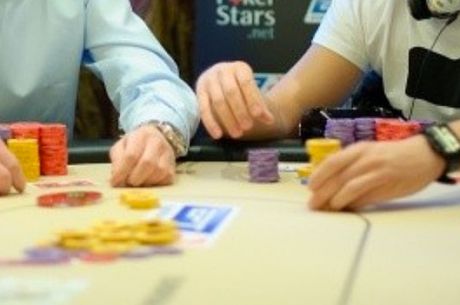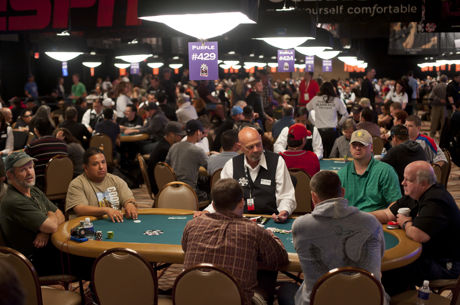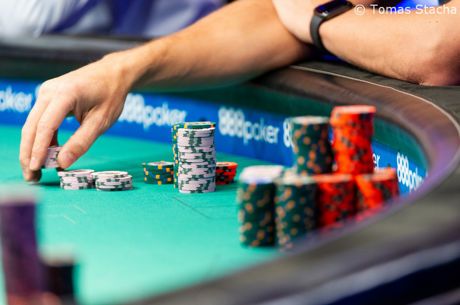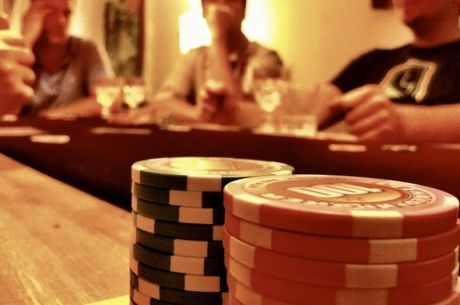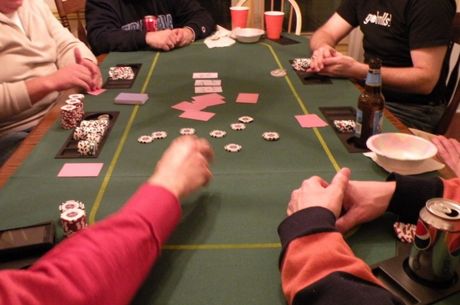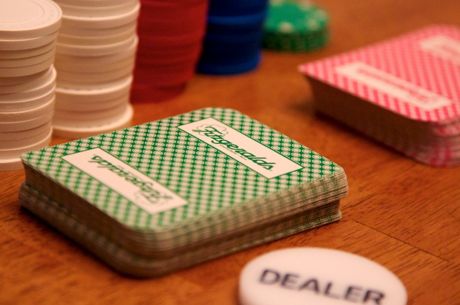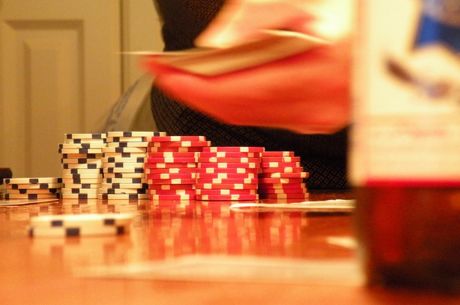Protecting Yourself Against Cheating in Home Games: Peeking at Cards and Chip Snatching

In the first of this two-part series about cheating in home games, I discussed collusion and how identify and protect yourself against it. Today I’ll conclude the discussion by addressing two other forms of cheating occasionally encountered in home games — peeking at cards and chip snatching.
Peeking at Cards: What It Is
Peeking comes in many forms. Someone might peek at opponents’ cards after they pick them up, of course. But this is obvious, and fairly easy to defend against. Just protect your cards when you look at them, giving no one a chance to see them.
I want to address a few of the less obvious forms of peeking — specifically peeking during the gathering up of cards from the last hand, peeking at them while shuffling, and peeking while dealing. I’ve seen each of these, but only very rarely.
Here’s how it works during the gathering of cards. A player gathers up the cards after the last hand is over and as he does he looks at some of the cards he’s gathering together, usually while bunching them together to square the deck for shuffling. In so doing he arranges a couple of cards near or at the top of the deck, then shuffles in such a way as to keep them there. He then knows where these key cards are, giving him an enormous advantage.
Peeking can also be done during shuffling. This is the easiest form of card manipulation, and I have seen it a couple of times in home games.
Imagine a player shuffling the deck like a dealer in a casino. Those are riffles. But home game dealers don’t always shuffle like that. They sometimes use the overhand shuffle, separating the deck between the two hands facing each other, then bringing the right hand and roughly half the deck up, then in a downward motion releasing a few cards on top of the cards held loosely in the left hand, and repeating this motion until all of the cards from the right hand have fully reconstituted the deck in the left hand, one small clump of cards at a time.
The overhand shuffle isn’t as complete a method of shuffling the cards as a riffle shuffle is. But it’s an easier method, so some home game players rely on it when it is their turn to shuffle. And it allows a player to move cards from the bottom of the deck where he might have seen them, to the top of the deck where they will come into play. Also, when the overhand shuffle is slowed way down, it allows players to look at the cards as they are passing from the right hand to the left. This, too, can give the dealer an unfair edge.
Finally, players can also peek at the cards while they are dealing them. The method often written about involves the use of a “shiner,” that is, a device that reflects the cards to the keen-eyed dealer. This device can be a lighter, a card protector, or even a ring — anything that can act as a mirror. By passing cards over it, cards can be revealed to the dealer as he deals.
I have never actually seen a “shiner” in use. (My suggestion to you is that you just make sure that any reflecting device be kept off the table.) But I have seen players peek at the cards more directly while they deal or during the play of a hand. It’s fairly simple to do and can be very tough to spot, so it may have happened to me when I didn’t notice.
Peeking at Cards: What to Look For
Regular home game players often expose cards to themselves and others when they shuffle. It’s natural. But if someone is doing it deliberately and trying to gain an advantage, there are certain things you might spot.
Look at the player who collects and squares up the deck. Is he giving a lot attention to the cards, looking at them carefully or unusually? Does he seem to be looking at the cards as he shuffles them? Is he positioning the cards when he shuffles them in such a way as to be able to see their faces? Do the cards seem to stay in the top of the deck when he shuffles? Does a bottom card make it to the top spot?
These are signs that he is peeking at the cards he’s gathering and shuffling to gain an advantage. Meanwhile there are signs as well of a player peeking at cards while dealing.
Imagine a dealer holding the deck after he has dealt the initial down cards. If he’s right-handed, he has just finished dealing the top card with his right hand while holding the stock (the remaining part of the deck) with his left. While players are focused on the action of the hand — looking at their cards, for example — the dealer can easily tilt the deck slightly, and then, with similar stealth, use his thumb to push up from the deck the top card, separating it slightly from the rest of the stock.
With the correct angle of the deck and the top card, it’s easy to sneak a peek at that top card’s corner, giving the dealer the advantage of knowing what the next card will be. If you want to see what this is really like, pick up a deck and start working with it in your left hand. You’ll quickly see that it’s relatively easy, even without great manual dexterity, to sneak a peek at a card if you are so inclined.
I’d also suggest that you watch the dealer, from time to time at least, to see if he is looking at the stock in his hand. If he is, see if the top card is raised. Don’t be subtle about looking, either. If a would-be cheat thinks that someone is watching and might be wise to him, he’s much less likely to try it in your game.
Peeking at Cards: How To Protect Yourself
A simple method that can eliminate one type of peeking is to establish a shuffling, cutting, and dealing procedure in your home game that prevents the dealer from shuffling the cards he will deal. Just have the big blind shuffle, pass the deck to his right when he is done. Have the small blind cut, and then give the shuffled and cut deck to the dealer. If the dealer doesn’t shuffle, and especially if there is a cut, it is much harder (but not impossible) for the person who gathers the cards to gain an advantage by peeking.
Another change that can help minimize opportunities for peeking is to have the dealer burn a card right before he deals or exposes cards for the next round of betting, much as a casino dealer does. It is much tougher (though not impossible) to peek at the second, third, or latter cards than it is to peek at the top card. Make it tougher on the would-be cheat, and deter him by getting the most likely card for him to peek at out of play.
I’ve seen players in home games do this burning prematurely — that is, right after they deal the down cards, right after they deal the flop, and right after they deal the turn. They think they are just making sure that they remember to burn the cards, but in fact they are defeating the whole reason to burn cards in the first place.
Peeking at Cards: What To Do About It
I remember once spotting a player looking at the cards as he shuffled them. He was using a hand-over-hand shuffle, not a riffle shuffle. He was looking down at the cards as they were nearly perpendicular to the table, and I saw his shuffle had slowed down considerably, allowing the cards to be viewed.
I couldn’t prove that he was doing this deliberately to gain an advantage, but I did discourage him from doing so in the future. I said to him calmly, almost humorously, that his shuffling style, slow as it was, might make some people think that he was peeking at the cards to gain an advantage, and I cautioned him not to do it lest people get the wrong idea. He never did it again (that I noticed).
Of course, if you see someone do this repeatedly, even after your cautionary word, you can speak to the host, inform him of your suspicions, and ask that the cheating player to be barred. Or, if you are really concerned, you can leave the game.
Chip Snatching: What It Is
Finally, let’s talk briefly about chip snatching. This is the coarsest form of cheating — just stealing, really. I have seen this happen in casinos and home games, though again it is very rare. Players just surreptitiously take chips from other players or from the pot, like picking someone’s pocket or shoplifting.
This can happen more often in home games, since players frequently grab and shove pots to other players. But as I say, it can also happen in a casino. I once saw a player boldly try and take a stack of green chips from the guy to his left. He was caught, pretended it was a joke, and the matter ended. But he was trying to snatch $500 in chips — no question about it!
Chip Snatching: What To Look For and How To Protect Yourself
Aside from these more blatant attempts to steal chips, there are other subtler ways cheaters may try to pilfer chips.
Watch the pot after you win. Make sure the chips you’ve won are making their way into your stack as they should. This is especially important during split-pot games and games with side pots, when there is likely to be a lot of handling of the chips.
Chip snatching occurs when no one is paying attention or when people are confused. If you pay close attention, you will be much more likely to spot it. And if it’s obvious you are paying attention, you will deter it.
Chip Snatching: What To Do About It
Your best course of action after spotting chip snatching is to act as if you assume that it was done inadvertently. Treat it is a mistake that just needs to be corrected. And if spotting it and announcing that there has been an error doesn’t stop the behavior in the future, you are probably best to leave the game.
Conclusion
From my experience and knowledge, cheating in home games certainly happens although it is quite unusual. Your best defense is to know what to look for, and to have a good systems in place — for shuffling, cutting, dealing, chip handling, etc. — to help reduce the chances of cheating occurring.
You will rarely get definitive proof that someone is cheating, so it’s best to be prudent in how you make your suspicions known. Letting the would-be cheater know, perhaps with some humor, that you are onto him or her is usually the best way of making sure that cheating doesn’t continue. If that doesn’t work, you might want to find a different game.
One other point to consider — cheaters may well be bad players. The amount they cheat may be considerably less than the amount they lose. Having them in a game, even though they may be cheating, may still be profitable for you (especially so if you are wise to their cheating and can adjust your play accordingly). If they are still a profitable addition to the game, you might consider just putting up with it — and continuing to win money from them!
Photo: “,” Viri G. .
Ashley Adams has been playing poker for 50 years and writing about it since 2000. He is the author of hundreds of articles and two books, Winning 7-Card Stud (Kensington 2003) and Winning No-Limit Hold’em (Lighthouse 2012). He is also the host of poker radio show House of Cards. See for broadcast times, stations, and podcasts.
Want to stay atop all the latest in the poker world? If so, make sure to get PokerNews updates on your social media outlets. on Twitter and find us on both and !


